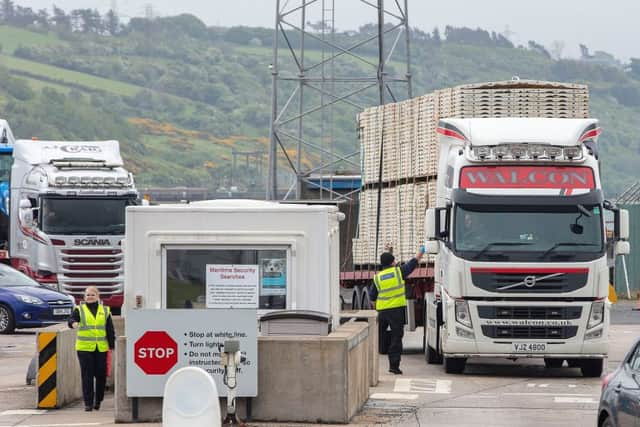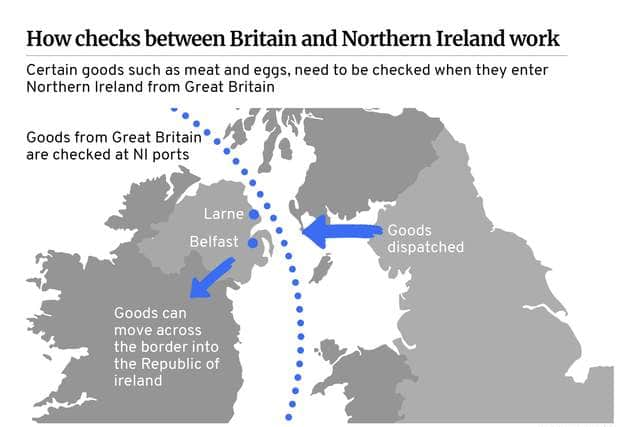Northern Ireland Protocol bill: new legislation explained, does it break law, what has the EU said?
and live on Freeview channel 276
The EU is launching fresh legal action against the UK as part of a series of measures in response to the government’s move to unilaterally scrap parts of the Northern IrelandProtocol.
European Commission vice president Maros Sefcovic has said Boris Johnson’s actions to unilaterally override elements of the Brexit deal are “illegal” and described the government’s Bill as “extremely damaging to mutual trust and respect between the EU and the UK”.
Advertisement
Hide AdAdvertisement
Hide AdThe EU is also resuming legal proceedings against the UK which were shelved last year to facilitate negotiations on post-Brexit trade.
It follows the publication of the government’s plan to give ministers legal powers to override the Northern Ireland Protocol, which cited a “genuinely exceptional situation” in Northern Ireland as grounds to break the treaty signed by the Prime Minister three years ago.


What has the EU said?
The EU has described the legal steps as a “proportionate” response to the government’s tabling of domestic legislation which would give ministers the power to axe large parts of the deal governing the movement of goods from Great Britain to Northern Ireland.
The bloc has insisted its “door remains open” for talks with the UK to find an agreed resolution to the furore over the so-called Irish Sea border.
Advertisement
Hide AdAdvertisement
Hide AdThe stalled legal action related to the UK’s unilateral extension of protocol grace periods in 2021.
Resuming the proceedings, the EU is issuing the UK with a “reasoned opinion” and giving it two months to respond. If the UK does not respond to the bloc’s satisfaction, it will refer the matter to the European Court of Justice.
The two new infringement proceedings announced on Wednesday (15 June) relate to alleged UK failures around Sanitary and Phytosanitary (SPS) checks on agri-food produce entering Northern Ireland from Great Britain.
The EU is issuing formal notices of action in respect of the two new infringement proceedings, alleging that the SPS checks are not being carried out properly, with insufficient staff and infrastructure in place at the border control posts at the ports in Northern Ireland.
Advertisement
Hide AdAdvertisement
Hide AdThe proceedings outlined on Wednesday do not specifically relate to the content of the government’s controversial Northern Ireland Protocol Bill, and the EU said any potential proceedings would only happen when the Bill was enacted at Westminster.
Mr Sefcovic told reporters in Brussels the UK government had set out to “unilaterally break international law”, saying the plan would mean “breaking an agreement that protects peace and stability in Northern Ireland, an agreement reached together only three years ago” by Boris Johnson’s government and the EU.
He said: “It has created deep uncertainty and casts a shadow over our overall co-operation, all at a time when respect for international agreements has never been more important.
“That is why the Commission has today decided to take legal action against the UK for not complying with significant parts of the protocol on Ireland/Northern Ireland.”
Advertisement
Hide AdAdvertisement
Hide AdMr Sefcovic added: “Let there be no doubt: there is no legal nor political justification whatsoever for unilaterally changing an international agreement.
“Opening the door to unilaterally changing an international agreement is a breach of international law as well.
“So let’s call a spade a spade: this is illegal.”
What could happen next?
The dispute could ultimately lead to a trade war, with tariffs or even the suspension of the entire Brexit deal between the UK and European Union, Mr Sefcovic said.
Asked about potential further action against the UK, he told reporters in Brussels: “If this draft Bill becomes the law then I cannot exclude anything.
Advertisement
Hide AdAdvertisement
Hide Ad“But we are not there yet and we want to solve this issue as the two partners should, through negotiations, looking for the common ground and delivering for the people of Northern Ireland.”
The European Commission vice-president warned the UK against ignoring any European Court of Justice rulings on breaches of the Northern Ireland Protocol.
He added: “Not respecting the European Court of Justice rulings would be just piling one breach of international law upon another.
He questioned whether that would be “compatible with the proud British traditions of upholding and respecting the rule of law”.
What is the Northern Ireland protocol?
Advertisement
Hide AdAdvertisement
Hide AdThe Northern Ireland protocol was implemented to prevent a hard border between Northern Ireland and Ireland after Brexit, and was approved by the EU and UK government in 2019 before coming into effect from January 2021.
The protocol prevents checks being carried out on goods travelling between Ireland and Northern Ireland, by keeping NI within the European single market.
England, Scotland and Wales left the European single market after Brexit, which means that there are additional checks for certain goods coming from the UK to Northern Ireland and vice versa.
Unionists are opposed to the protocol as they believe it creates a trade border and undermines Northern Ireland’s place in the UK.


What is the new legislation?
Advertisement
Hide AdAdvertisement
Hide AdThe government published a new Bill to amend the Northern Ireland Protocol on Monday (13 June) amid criticism over post-Brexit protocol in the country.
The legislation will give ministers powers to override elements of the protocol, which was jointly agreed by the UK and EU as part of the Brexit Withdrawal Agreement to keep the Irish land border free-flowing.
The arrangements instead require regulatory checks and customs declarations on goods moving between Great Britain and Northern Ireland.
Unionists in Northern Ireland are strongly opposed to the international treaty, claiming it has undermined the region’s place within the United Kingdom.
Advertisement
Hide AdAdvertisement
Hide AdThe Bill, which was published on the evening of 13 June, will allow businesses exporting to Northern Ireland from Britain to choose to follow either EU or UK standards, which the Conservatives have said will make the exporting process simpler for companies.
Goods exported to Northern Ireland will be able to use a ‘green lane’, which will result in fewer customs checks. Those destined for EU locations will be required to follow a ‘red lane’ with more custom checks.
If voted through parliament, the bill will also remove the European Court of Justice as the arbiter of trade disputes. Instead, an independent body will deal with these disputes.
Foreign Secretary Liz Truss said the bill amendement will “fix” issues that have arisen since the protocol was introduced and would allow for an easing of check for companies selling goods from Britain and importing to Northern Ireland while also removing the European Court of Justice as the arbiter of trade disputes.
Advertisement
Hide AdAdvertisement
Hide AdShe said: “This bill will uphold the Belfast (Good Friday) Agreement and support political stability in Northern Ireland. It will end the untenable situation where people in Northern Ireland are treated differently to the rest of the United Kingdom, protect the supremacy of our courts and our territorial integrity.
“This is a reasonable, practical solution to the problems facing Northern Ireland. It will safeguard the EU Single Market and ensure there is no hard border on the island of Ireland. We are ready to deliver this through talks with the EU. But we can only make progress through negotiations if the EU are willing to change the protocol itself – at the moment they aren’t. In the meantime the serious situation in Northern Ireland means we cannot afford to allow the situation to drift.
“As the government of the whole United Kingdom, it is our duty to take the necessary steps to preserve peace and stability.”
Is the bill lawful?
Northern Ireland Secretary Brandon Lewis has insisted the legislation is “lawful” and “correct”, but critics say the move is “disgraceful” and Labour has accused the government of “law-breaking”.
Advertisement
Hide AdAdvertisement
Hide AdMr Sefcovic said the UK Government had set out to “unilaterally break international law” and said changing an international agreement is a “illegal”.
He said that Boris Johnson’s government knew what it was signing up to when it agreed the Northern Ireland Protocol, but suggested the government had not been open with the public about what it involved.
He told reporters in Brussels: “I’m sure the UK government knew perfectly well what they signed up to when they agreed to the protocol – although I have to admit they didn’t do a very good job explaining it to the public.
“Most importantly, it is legally inconceivable that the UK Government decides what kinds of goods can enter the EU single market.”
Advertisement
Hide AdAdvertisement
Hide AdIn response to the bill, Sinn Fein vice president Michelle O’Neill agreed that Boris Johnson was potentially breaking international law.
In a statement made prior to the publication of the bill amendement, Ms O’Neill said: “Today’s action by Boris Johnson in Westminster is absolutely reckless, it is disgraceful, it does nothing to serve the interests of the people here.
“It flies in the face of an international agreement which he himself negotiated. It is in clear breach of international law.”
Foreign Secretary Liz Truss has insisted there is “absolutely no reason” why the EU should be angered by the controversial plans to override the Northern Ireland Protocol and that she had to take action over the Northern Ireland Protocol because of the political situation at Stormont.
Advertisement
Hide AdAdvertisement
Hide AdSpeaking on the BBC Good Morning Ulster programme on Tuesday (14 June), she said: “The reason that we feel that we absolutely had to take action is because of the situation in Northern Ireland.
“The fact is that the Belfast/Good Friday Agreement is being undermined. We haven’t seen an Executive formed since February, we have seen east-west trade diminished, trade diverted to north-south. We’ve also seen the people of Northern Ireland not able to benefit from tax breaks.
“These are all issues that we need to sort out. Our preference is to sort them out with the EU, but as yet the EU are not agreeing to change the text of the protocol.”
She added: “I think it’s important to note that issues like customs, issues like tax, are baked into the text of the protocol. That is why we are taking action. We are doing so in a reasonable way that continues to protect the EU single market.
Advertisement
Hide AdAdvertisement
Hide Ad“I think the important point, and this is what the Prime Minister was driving at, is that it won’t make the EU any worse off. There is simply no reason for us to have a war of words about this, this is very much reasonable action we are taking.”
Comment Guidelines
National World encourages reader discussion on our stories. User feedback, insights and back-and-forth exchanges add a rich layer of context to reporting. Please review our Community Guidelines before commenting.
